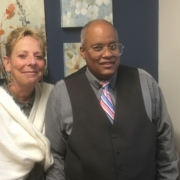Job Camp: Empowerment Through Employment And Opportunity. An Interview with Bill Strazzullo, founder of Job Camp.
“I’m a finance guy, financial market guy, ex-Wall Street trader. Don’t hold that against me.”
A familiar face to anyone with an eye on the markets or the major financial news programs, it’s easy to think Bill Strazzullo could be doing more lucrative things with his free time than volunteering. But for over three decades, Bill’s done exactly that – serve the community with the same vision, energy, and drive he brings to his day job as Partner and Chief Market Strategist for Bell Curve Trading. From the Ivy League to the inner-city streets of New York City and Boston, Bill’s nonprofit work earned him many honors, including the Providers’ Council 2017 Volunteer of the Year.
However, Bill Strazzullo’s Ninth Symphony is Job Camp, the innovative career training program for the disability community he developed in partnership with NuPath. As Bill tells it, the initial problem was all too familiar, “The unemployment rate for people with developmental challenges in the private sector – it’s like 85% – it’s ridiculous.” With his keen eye for a worthwhile investment, Bill saw the opportunity in a crisis. “As a business person, I know there’s a lot of big-box retailers, chain stores, and restaurants that would love to have somebody who could come in, especially if they’d work an odd shift.” Bill continued, “I said, “If I can coach NuPath’s clients and bring them to a point where they can walk into a business, be professional, and perform basic functions, we’re going to get them jobs!”
Job Camp’s success rate – the number of students who secure employment – is 50%, beating the national average. Good, but former Wall Street trader Bill Strazzullo doesn’t define Job Camp’s impact using simple math.“The whole point is to create a more fulfilling life. When you think about it, everybody in the class is 22 or older. If you’re an adult and you don’t have a job, you’re isolated. A job is one of the primary vehicles that connects you with a community. So it’s not just about the job and getting a paycheck. It’s about being part of something bigger. It’s about meeting new people, learning new things, and living a more independent life. My goal is to create a situation where that person is living up to their potential – whatever that potential might be.”
The Breakthrough: Where does an ex-Wall Street trader find the passion for volunteering?
Bill Strazzullo: After starting my own business, I took a year off because things were just crazy. Upon returning, I missed volunteering but not the high-level stuff – I didn’t have any connection with the people I was trying to help. So I started with the Massachusetts Association for the Blind, and for close to seven years, I spent nearly every Saturday assisting a blind elderly woman by reading her mail, writing her checks, or simply just talking with her. A total epiphany because I felt like I accomplished more with her than everything else because I helped one person in a significant way. I said to myself, “Look, I want to take that and then go a step further.”
How did you and NuPath get together to create Job Camp?
NuPath is the most special place. Amazing culture, amazing people, and amazing mission. Whenever I do nonprofit work, I always try to challenge myself because I want to get something out of it, too. Because I work a ton of hours, my only real constraint was wanting to do something closer to my office. A Google search led me to NuPath – I didn’t know about NuPath even though I grew up here, first in Somerville and then Winchester – so I cold-called about three or four times before someone actually returned my call. (laughs)
A NuPath volunteer took my call and said they happened to have an office near mine. I went over, and they asked, “What do you want to do?” I said, “I’m a local business person, and I’d like to take my business skills, train people in your program, and help them get jobs.” NuPath looked at me and said, “You’re gonna come in here, design a course, teach that course, and mentor people to get jobs for the whole school year – for free?” I said, “Absolutely.”
Was the robust curriculum always part of Job Camp’s master plan?
With a social worker at NuPath, I spent a full year designing the class. I wanted to go in there with a curriculum and didn’t want to do this by the seat of my pants. Together, we mapped out every class in five and 10-minute segments to keep students’ attention. Then, about three weeks before we were about to start, the social worker left. At that point, I seriously thought, “Should I go forward with this?” I didn’t have any background in teaching or even working with the disability community. Now, I’ve done hundreds of television interviews, but I was never more afraid in my life than walking into class for the first time.
Didn’t scare you off, did it?
After about 10 minutes, I knew I was doing the right thing because I was amazed at how fixated the students were on me. At the end of that first class, everyone came over and said, “Bill, are you going to come back next week?” I got the purpose. I saw the importance of this.
Describe the class experience. Where do your students begin?
Every class begins with students having to come in from the hallway to introduce themselves. We start with the basics – like making a good first impression, good eye contact, and what the expectations are going to be. So many in the program have had very little job experience, and just like anybody else, I want them to be prepared. I want them to be dressed appropriately. I want them to act appropriately.
Teaching and coaching both have important roles within Job Camp.
How to find a job is the next important lesson. We instruct students on how to use a computer for a job search and where to look – Monster, LinkedIn, Indeed, etc. We make sure everybody in class has a resume, which is not an easy thing. The job coaches at NuPath help them collect their data. “Where did you go to school? What job experience have you had in the past? Have you done any volunteer things?” I want everybody in the class to be as professional as possible walking out and going into that job. We do mock interviews, where we tape students doing a live interview with one of the job coaches. Believe me; I break that tape down as good as Bill Belichick (laughs). We go from the second that door opens: How is your eye contact? Do you have a smile on your face? How will you dress? How is your posture? 50% of an interview is nonverbal, and we make sure that the nonverbal stuff is nailed down.
Money management is even taught in class, correct?
I bring in somebody from Citizens Bank to go over money management. What does Direct Deposit mean? What does it mean to have an ATM? Do you ever give your Social Security or your credit card numbers out to anybody? When somebody graduates from Job Camp they have a resume, are comfortable interviewing, and know how to manage money.
Do potential employers hold misconceptions or biases about hiring from within the disability community?
You have to understand the history here. The Americans With Disabilities Act banning discrimination against the disability community wasn’t passed until 1990. Not all that long ago, it wasn’t illegal to not hire someone because they ‘looked’ disabled. When we talk about trying to get students in the program jobs, we’re talking about overcoming decades of marginalization and discrimination. A lot of the people in Job Camp are classic examples of diminished expectations. A big part of Job Camp is building self-esteem – proving to themselves they can go out and do the job. Then, it’s convincing someone at the employment site to give them a chance, and if they do, that person is going to do the job just fine.
Discuss some of the external barriers to employment.
Transportation’s a huge issue now. It’s really hard to find people to provide the transportation. The majority of students in our program do not drive. NuPath’s employment coordinators have gotten to the point where they provide job coaching while driving a client to their job. That’s the only way they can get there. NuPath has a pretty seasoned client who’s been coming to us for many years, Suzanne. She’s learned how to Uber, and we’ve set her up with the technology to do that. Suzanne has a smartphone and gets herself back and forth to work.
A tricky sticking point for so many in the disability community who have the ability to work can’t, simply because they can’t get there. That’s a tough, tough nut to crack sometimes.
Is technology making workplaces more accommodating for the disability community?
Dan Harrison – President & CEO at NuPath Inc. – coined the phrase “technology is a human right.” That’s all about access to and providing the tools for our clients – online access, Wi-Fi, tablets, apps – to be able to put to work exactly what they just learned in Job Camp. There’s also a training aspect of the public and the business community – they’re still learning there’s no more sub-minimum wage work, that you can’t put clients in a sheltered workshop and have them put fuses in boxes for dimes on the dollar anymore. They need to be employed by the company and physically be at a location that employs them by the hour and pays them a living wage. And that’s where we’re at today.
Where does Job Camp go from here?
We proved the concept. My dream is to take this program and replicate it with other organizations, communities, and agencies. There are hundreds of thousands of adults with developmental challenges in Massachusetts. My goal here – my mission – is for anybody who wants to work and has been excluded from the private sector to get the training, opportunity, and coaching they need.
This I know: Never underestimate the ability of human beings who really want to make their lives better.
Note: This interview has been edited and condensed.










Leave a Reply
Want to join the discussion?Feel free to contribute!